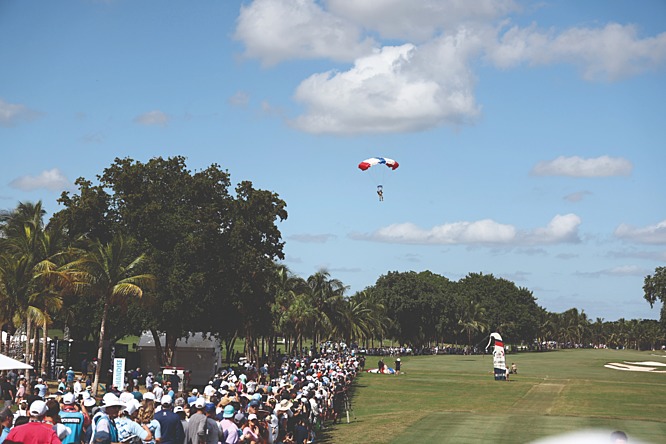Teeing off: How insight is building the LIV Golf brand

It is rare that the genteel world of golf is at the centre of debate. But on 17 March 2022, former golf star Greg Norman announced that a new series of tournaments had been created, with prize money of $255m and radical alterations to the traditional format and structure.
If that wasn’t controversial enough, the tournament is being funded by the Public Investment Fund (PIF) of Saudi Arabia.
LIV Golf’s emergence grabbed headlines across the world and attracted robust opposition from the sport’s governing body, the PGA. Since then, a series of tournaments has emerged, taking place from Bangkok to California and many places in between, rivalling the PGA’s dominance in the sport.
Creating a new format in any sport is incredibly hard. Cricket has seen the Indian Premier League (IPL) and, in the UK, The Hundred emerge, with new teams and a mission to build huge franchises and fan bases from an almost standing start. LIV Golf has a similar focus on teams of golfers and has had to hit the ground running, while also facing serious resistance from within the golfing world.
Building insight
Just as LIV Golf has had to create a new format for golf from scratch, its insights department has also had to be set up at rapid speed. Ross Antrobus, vice-president, insight, analytics and loyalty, joined the business in February 2022 from the Football Association – where he was head of behavioural insight and business analytics – ahead of the March announcement. With the first event due to take place in London on 9 June, there was a lot of work to do to get an insights function up and running to help shape the tournaments.
“There wasn’t an insight function, but there was a huge desire for insight to be present within the organisation,” Antrobus says. “We hadn’t heard from any golf fans or spoken to any golf fans. When I came into the business, brand-building work was needed – understanding what golf fans did and didn’t like about the status quo. We were going to disrupt the status quo and be the antidote to some of those ills.”
Two streams of work needed to start straightaway; the first to get a short-term understanding of fans’ views, both those watching events in person and those viewing through streaming content. The company also needed longer-term analysis to help with negotiating broadcast packages and attracting sponsors for future years – while 2022 was a test year, with free-to-air content, it is envisaged that 2023 will have more traditional sports broadcast deals in place. This also meant using insight to help defend a fledging – and controversial – new brand from its opponents.
“We needed to look at what we gathered in 2022 to allow us to tell compelling, data-led, insight-led stories,” Antrobus says. “At the same time, we are not without our detractors – we are not everyone’s favourite ‘new kid on the block’. A big role of insight here is how we use insight to protect and promote the brand. How do we get proactive news stories out there about what we are doing that contain data to prove our point?”
Antrobus likens building the insight function in this environment to using a microscope and telescope at the same time, and adds he found it “hugely exhilarating” working out how to collect data and set up the research operation quickly and creatively.
The speed at which the organisation was created necessitated working primarily with agencies, of which two – 7th Sense Research and Blue Yonder – were tasked with live reporting during the early events. The company has also worked with suppliers including YouGov Sport, MTM Sport, Toluna, Critical, The Point Insights and Mindprober. The research team has conducted post-event analysis mainly in-house, and social media monitoring through the Talkwalker platform.
A ‘small and busy’ team is now in place, with Adam Lawson joining as insights manager and an intern based in New York. Antrobus expects that the team will have at least doubled in size by autumn 2023.

Driving range
Eight LIV Golf weekends took place in 2022, with 14 set to take place this year. Each of them has needed fan data to be collected and analysed continuously throughout the weekend, with data from day one helping to shape days two and three of the event. The company held all-staff meetings every evening on an event weekend to analyse what worked and what did not, and where improvements could be made. Antrobus says quantitative and qualitative data was ready for those meetings 90 minutes after play finished.
The leadership team also gets regular insight updates on issues such as fan sentiment, as well as information that could provide good media talking points. “We do the right work at the right time to make sure we always have data to hand that can help our agendas and give people good speaking points,” Antrobus adds. Other areas of focus include broadcast ratings, social media growth and following, and sponsorship exposure. Most of the senior executives at LIV Golf come from organisations that are very data orientated, Antrobus explains, which has helped the insights function hit the ground running.
While there is no insight portal yet, because of the relatively small size and newness of LIV Golf, the research team share insights work across business once it is complete. “Once you get known as the person or people who might be able to answer a question for someone, you suddenly become the place everyone wants to come to,” Antrobus says, adding “it is not just about how you drive the business forward, but how you get the business to invest”.
Each tournament has qualitative fan forums post-event – sometimes with up to 20 participants – with senior team members invited to attend on the understanding that they make themselves available to answer any questions.
“I’ve never been a fan of keeping data to myself,” Antrobus says. “I want people to come to see and listen to fans speak in their own words about our brand and events – the fans can express it far better than I can. The return on that is that I ask them politely, but sternly, to attend the debrief afterwards to discuss what we do with what we have learnt.”
The quick turnarounds needed to allow LIV Golf to evolve – Saturday and Sunday fan forums are often discussed on a Monday morning – mean the insights team has had to be more willing to share incomplete information. Antrobus says that, sometimes, 75% of the right answer at the right time can be better than 100% of the right answer at a much later date, especially during a hectic golf season. “That immediacy of reporting in this business is needed and much appreciated,” he explains. “We need to be slightly more accepting of partial data and partial answers so we can deliver at the right time.”
There’s a need for flexible working, given the global nature of the tournaments, with matches having been played in the US, the UK, Saudi Arabia and Thailand.
“I don’t need people to work 24 hours, seven days a week,” states Antrobus. “But I do need people to approach it with an open mind – you might be on a 3am call to Bangkok, but then you can make sure your afternoon is clear and catch up on sleep.”
LIV Golf has used insight to help combat criticisms about its role in the world of golf and its Saudi Arabian funding. Antrobus says his work with the communications team has focused on using data to support its narrative, either through providing evidence to counter criticism of the organisation, or demonstrating how the game of golf was “poorly served” by its previous stakeholders.
LIV Golf has altered the game’s format in a bid to appeal more to fans, such as having shorter events with more music and entertainment and more of the sport’s big names appearing.
“You will read articles about how we are divisive in golf and not good for golf,” Antrobus says. “But one of the first pieces of work I did was with golf fans in the UK, the US and Japan to understand what they did and did not like. They said it takes too long, you don’t see enough golf in traditional coverage, and it is a bit traditional and ‘stuffy’.”
Working with Mindprober, the company has also used galvanic skin response and body temperature measurements to examine how fans engage with broadcasts and to analyse how effective it is at fan retention.
There are lessons to be learned from elsewhere. Cricket has seen several new leagues and formats over the years, some of which have proved majorly successful.

“The good thing with sports fans is that they are often fans of other sports,” Antrobus says. “When you look across at the IPL or The Hundred, part of that offers reassurance that fans are open to innovation. You can tap into that from a research point of view and you can show some of those as examples in research, as a shortcut.”
The future priorities are building on last year’s successes with attracting fans and sponsors, and creating more of an emotional connection with fans over the longer term. LIV Golf is also trying to establish how it can build a following for its teams. It has golfers working in teams, and the challenge has been that most of the teams have no geographical ‘hook’ to persuade fans to support them. The insights department will, therefore, be examining the ‘back story’ for each team over the next six months.
Then there is building greater knowledge of the brand’s image and potential sponsorship opportunities. “We’re keen to demonstrate that we’re a brand not just for expensive watches, champagne and fancy cars, but also, if you’re an online streaming or gaming platform, we’ve got a brilliant audience that over-indexes in that world – and if you’re a fledgling fashion or lifestyle brand, a lot of our audience is exactly the audience you’re looking for,” says Antrobus. “That is a new story for a golf brand to tell, and they are brands that wouldn’t normally knock on our door, and wouldn’t expect us to knock on theirs. We have done a lot of work to bring those audiences to life and demonstrate their value.”
The challenge for LIV Golf is how it can use insights to help transform golf, and to defend the company from concerns about PIF’s role in the years ahead.
Work on building the brand is ongoing, but the PIF funding and Saudi Arabia’s involvement is still a major element of the story, and remains extremely divisive, with some fans happy with its impact on the game and others concerned about the potential for ‘sportswashing’ the Saudi regime.
“We have never shied away from where our investment has come from,” says Antrobus. “We have not hidden that from fans. We have done work through social media and media monitoring to look at how other people are talking about us.
“All you can do is be honest where the money comes from. Some people will not be happy about that and will never be happy about it. But we are not using it to take other golf away from them.
“We are not trying to preach to people that we are better than anywhere else. We are offering what we feel is a relevant, contemporary, engaging alternative to golf that has sat on a shelf unchanged for too long and was starting to be left behind by other sports.”
This article was first published in the January 2023 issue of Impact.

We hope you enjoyed this article.
Research Live is published by MRS.
The Market Research Society (MRS) exists to promote and protect the research sector, showcasing how research delivers impact for businesses and government.
Members of MRS enjoy many benefits including tailoured policy guidance, discounts on training and conferences, and access to member-only content.
For example, there's an archive of winning case studies from over a decade of MRS Awards.
Find out more about the benefits of joining MRS here.













0 Comments